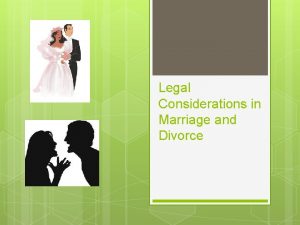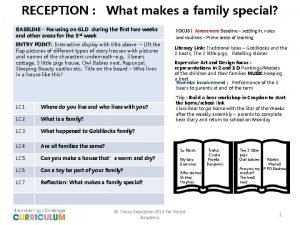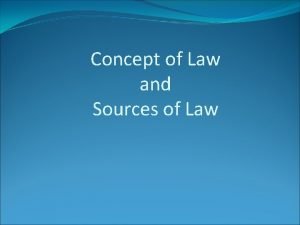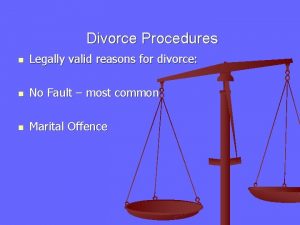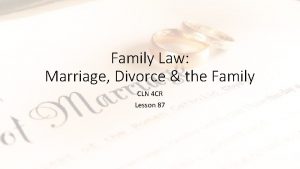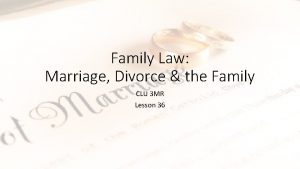FAMILY LAW DIVORCE II DIVORCE II Special reasons









- Slides: 9

FAMILY LAW DIVORCE II

DIVORCE II • Special reasons for divorce 2: • Commiting a humiliating crime and leading a dishonorable life • Desertion • Mental illness • General reasons of divorce 1: • introduction

DIVORCE II • Commiting a humiliating crime and leading a dishonorable life • These are relative divorce reasons. • In these cases, the judge will searcch whether the marital union is damaged/collapsed or not. • They are stated as divorce reasons in art 163 of TCC. • The conditions of these reasons cannot be changed by the parties’ wills.

DIVORCE II • Commiting a humiliating crime • As it can be undestood clearly, not all crimes can constitute a divorce reason. • Only a humiliting crime can be a divorce reason. • The humiliating level of the crime will be understood from the society’s view to that crime. • The punishment for this crime is not important. • This crime should be commited after the marriage, during the marital union.

DIVORCE II • Leading a dishonorable life • As the code states this reason as a «lifesytle» , the act of having a dishonorable lifestyle should have a duration and continuity. • Generally, the businessees which are not accepted by the society, having an drug addiction or alcholism considered as leading dishonorable life. • This type of life can exist before the marriage. The important part is that this lifestyle should exist during the marital union.

DIVORCE II • Desertion is regulated in art 164 of TCC. • It is an absolute divorce reason. Therefore, when the conditions of the desertion is set, the judge must decide to divorce. • In general terms, it is the will of the one spouse to end the conjugal life unilaterally.

DIVORCE II • In case a spouse leaves the conjugal life place in order not to fullfill his/her obligation or doesn’t return the nojugal lifeplace without a justified reason, this action will be considered as desertion if it lasts at least 6 months. • The one who forces the other spouse to leave the conjugal lifeplace is also considered a deserter. • There also time limits to opern a divorce suit based upon desertion.

DIVORCE II • Mental illness • According to art 165 of TCC, if a spouse has a mental illness and because of that the conjugal life is unberable for other party, if the uncurability of the mantal illness is proven with a medical report, the spouse can open a divorce file against the ill spouse. • For that, the mental illness should exist during the marital union. • There isn’t any time limit. • This is a relative divorce reason, the judge will search the unberability of the conjugal life for a spouse because of the mental illness.

DIVORCE II • General reasons of divorce – Introduction • The general reasons of divorce are regulated in art 166 of TCC. • They are (i) rupture of marital union, (ii) pact of divorce and (iii) non establihment of the matrimonial life. • The key point for all these reasons is that the judge will decide whether the marital union and the conjugal life is unberable for parties.
